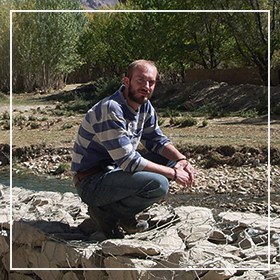We are immersed in cyber worlds. Such a dominant, human-made feature of contemporaneity plays a fundamental role not simply in shaping our perception of reality, but indeed in creating particular conditions in which to spend our lives and think about our future. Carolyn Nordstrom and Lisa Carlson recently co-authored Cyber Shadows, a timely and important book. They kindly agreed to discuss it with us.
Would you tell our readers how this editorial project started?
CN: I’ve discovered we don’t so much pick books to write as they pick us. I was hacked pretty badly, a targeted hack that went on for some years. Periodically I’d find a bit of code left behind and search on it. These dropped me into various websites – mostly extra-legal and many fairly horrific (the first I discovered offered slaves on cruises, another car-hacking to control target’s cars, and of course vast amounts of spyware and computer-controlling malware).
 What I discovered in researching cyber-crime cannot be overstated: what most of us take to be science fiction is taking place worldwide in real time, and our daily lives are powerfully affected. Battles over control of digital-spaces and their emerging epistemic frameworks rage globally.
What I discovered in researching cyber-crime cannot be overstated: what most of us take to be science fiction is taking place worldwide in real time, and our daily lives are powerfully affected. Battles over control of digital-spaces and their emerging epistemic frameworks rage globally.
The book decided me at this time. I texted an undergraduate just beginning her sophomore year – I hadn’t seen her writing nor had her in class – she merely walked into my office to ask some questions: “We’re doing a book.” I wanted the voice of a person in the Net-born generation. On a deeper level, I wanted to challenge the pervasive clichés that students today are socially and educationally stunted digital-Frankensteins.
Why do you think it’s important to read this book?
CN: Everything is hacked. As General Keith Alexander – until recently the (in)famous head of USA’s CyberCommand and the NSA (spying program) – said at Def Con 2012 to ten thousand hackers: They’re in. From the DOD to the average person – get used to it, there’s no securing devices anymore. We need a new way of thinking.
Beyond more commonly discussed innovations in cyber-war, espionage, and corporate-attacks, a few examples of why this is important include:
– 56% of US banks were hacked in 2012, the average loss over 5 million dollars, and it worsens every year. Nations’ financial systems face collapse if they continue hemorrhaging such massive sums.
– Malware has been found in everything from the software running life-saving medical technologies to security-systems that now spy back.
– Behavioral pattern theft, a quantum advancement over identity theft, is a multi-billion dollar industry amassing and selling profiles of “anyone” without their knowledge to “anyone” – from our banks, schools, and jobs to security forces, criminals and those experimenting in social control.
– Cyber attacks are redefining the most basic ideas/ideals of political and personal violence, governance and security in ways we little understand. A joint 2014 USA National Academy of Sciences/DARPA study concluded digital-technological developments are now beyond the scope of all existing legal, social, and ethical systems.
Invisibilities are battlegrounds in the pursuit of power – and the void of societal knowledge about Net-realities is wide-spread. As I conclude in Cyber Shadows:
We, our digital lives, finances, behavioral patterns, political and economic choices, and our very constructions of self are the battlegrounds, the resources, the spoils of the new era – and the harbingers of peace.
LC: Read this book because your life is online now. Understanding the cyber world is like knowing how to drive a car or pay your taxes. You don’t necessarily need to understand how the Internet works the way it does, any more than you need to know the inner workings of a car or the advanced mechanics of the legal system, but you should definitely learn about some of the major threats you face navigating this new terrain.
What idea of “humanity” have you found in the “dark places” of cyber worlds?
CN: “Dark Spaces” in the cyber-universe are dark not because they equate with bad, but because they are uncharted and emergent – places where established epistemic knowledges become inadequate. The places on maps that for millennia have said “dragons be here.”
The uncharted “ends of world ” have always drawn a boundary-breaking mixture of creative intellects, explorers and architects, rebels, artists, rogues, power-mongers, and criminals.
In this mix shared knowledges, values and ethics, habits, behaviors, and worldviews are created to navigate unknowns. Perhaps here the most profound bones and guts of “humanity” become visible.
I’ve seen some truly heinous aspects of humanity on the Net: large global Web-marts selling everything from babies and slaves to lethal cyber-weaponry and massive financial crime malware systems. But that’s not new, just a technologically enhanced extension of the extra-legality we see in the material world.
More interesting are emergent sets of international values and practices among cyber-literati (hackers in common usage). Many, often on their own, are battling the destructive uses of the Net. This is not a small thing: people worldwide are using net-skills to expose corruption, injustice, war crimes; to ameliorate suffering, abuse, inequality. These are not knee-jerk reactions: strong currents of philosophy, morals, and best practices are debated online worldwide in hackers’ forums and IT sites.
No matter how much governments and lawmakers would have us believe otherwise, it’s the architects and denizens of the Net who are the only people currently capable of forging real time solutions.
What does an unorganized, random, fluid set of constantly changing individuals and collectivities forging uncharted emergent knowledge, value, and social foundations say about (our notions of ) humanity?
LC: I think people have the tendency to see the deep web as a dark, scary place. And, in some ways, they’re right. It is. You get unimaginably horrible things at the fringes of the cyber world: snuff films, human trafficking, child pornography… The back alleys of the web are littered with these instances of human decay. It reeks almost of evil. However, down these same dark alleys, you’ll find heroes. Online communities have formed to combat the decay happening online, and they’ve had considerable success doing so. These vigilante groups are flawed, definitely– think more Rorschach than Batman– but they speak to something amazing about humanity. They show that, even when masked, people are more good than bad. And so communities self-regulate.
To me, this is one of the most interesting thing to see online: you have a lot of people occupying a sort of gray area morally, but they have their own lines that they enforce.
4chan might, for instance, be a haven for some depraved stuff, but they have also come together to stop online demonstrations of animal cruelty and child abuse. For example, when a video was posted of a woman squashing a kitten to death with her shoe, it was the infamous /b/ forum that pooled their skills and found the culprit.
Online, the good guys and the bad guys are often the same people on different days. Conventional wisdom among the cyberati seems to be that there are no whitehat or blackhat hackers, only hackers. And yet there are self-enforced rules that everyone seems to tacitly agree on. Bad things happen, of course, but communities rises in outrage against these things. On the whole, the good tends to overwhelm the bad.
Humanity, for me, comes into sharp focus when people gather and discuss. The people carve out a place in the midst of the great machines of industry and government. They almost instinctively step out of the way of these giants and gather somewhere outside the realm of convention and order. It’s been coffee houses, parlours, and saloons in the past.
Today, the online forum is the single most notable gathering place for ideas and conversation. What could be more human than people reaching across time and space to discuss their interests, ambitions, hopes, dreams, fears… Friendships are forged, information shared, and movements started in these quiet corners of the web. Look at memes! I can’t think of anything more human than that: a simple visual joke pattern that can be replicated and repeated ad nauseum.
From cave paintings to Roman graffiti, it’s somewhere in human nature to try to make a quick, often vulgar joke and share it. I guess what I’m saying is this: people love to talk about the Internet as though it has changed us. I don’t believe it has. It’s just given us a new place to be ourselves. And, if anything, it has improved us by allowing us access to more information and more people. Humanity is the same as it’s always been. Now it just has Google to tell it to be or not to be.
How did carrying out research for this book and writing it change your ordinary life, if it has?

LC: I wish I could say that it made me an expert on technology. It didn’t. If anything, it made me realize just how much I have left to learn. Every time I’m online now, I’m absolutely awed by the amount of brainpower that had to go into all of it, by how much collaboration and cooperation it takes to keep it all working. I look over code, and I am floored by the intricacy of it all: a symphony of human effort and concentration. I only understand about 5% of it.
Sometimes, my ignorance gives me pause— what are they doing with my information? am I being tracked? that sort of thing… Most of the time, however, it fills me with this immense hope. Look at what we, collectively, did! People came together to create this amazing thing, and now people contribute constantly to it and build it up with their own experiences, stories, and hobbies. I’m so glad to be alive at a time when I can watch it all unfold. It’s truly incredible.
A member of the Notre Dame faculty since 1997, Carolyn Nordstrom is an anthropologist at home in lecture hall and war zone alike. She studies wars, the illegal drug trade, gender relationships, and war profiteering. Her research has made her an eyewitness and scholar of worldwide urban and rural battlefields as well as of the shadowy worlds of diamond, drug, and arms and smuggling. In addition to her teaching and lecturing, she was recently awarded John D. and Catherine T. MacArthur and John Simon Guggenheim Fellowships and has written dozens of articles and several books including “Global Outlaws: Crime, Money, and Power in the Contemporary World,” “Shadows of War: Violence, Power, and International Profiteering in the 21st Century,” “A Different Kind of War Story,” “Fieldwork Under Fire: Contemporary Stories of Violence and Survival,” and “The Paths to Domination, Resistance, and Terror.”
Lisa Carlson wrote “Cyber Shadows” while studying anthropology at the University of Notre Dame. She has since graduated and moved to New York, where she now works in digital television.








